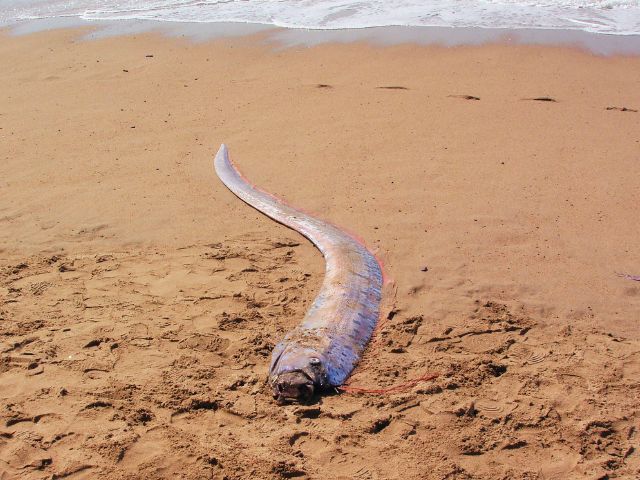
Do you ever check out the News section on YouTube? Among today’s top news offerings were reports about the recent find of a rare oarfish.
The first headlines were fairly mundane, which is why I ignored the story at first. Inside Edition and NEWS CENTER Maine had nearly identical cover images of a massive, silvery, serpentine-looking creature on a paddleboard in the water with people around it. Their titles were similar, too. “Rare oarfish found off California coast,” the one from NEWS CENTER Maine read. “Rare Deep-Sea-Dwelling Oarfish Washes Up Near San Diego,” Inside Edition stated.
Pretty tame, right? I wasn’t sure why that was considered top news until I clicked over several more stories and found another oarfish story, this time from the New York Post.
The cover was different from the other two but showed part of a sea serpent in the water. The headline was a lot more attention-grabbing. (As you’d expect from the New York Post.) It read: “‘Harbinger of doom’ oarfish found floating off California coast two…”
Whatever came after the two was cut off from my screen. Even though the word “harbinger” was in it, I didn’t click through to watch. I do not want to encourage YouTube’s algorithm to shovel any more sensational New York Post videos into my feed than it already does.
That’s also why I didn’t click on FOX Weather’s video, whose headline read, “‘Doomsday Fish’ Found Dead Off The Coast Of Southern California.”
But “harbinger of doom” and “doomsday fish” had definitely piqued my interest. So, instead, I simply Googled “oarfish,” curious to see what that would bring up. The headlines under the “Top stories” section of results delivered more of the same.
- “‘Incredibly rare’ dead sea serpent surfaces in California waters; just 1 of 20 since 1901” – USA Today
- “Paddle-boarders find rare ‘doomsday’ fish off California coast” – BBC
- “A 12-foot-long harbinger of doom washed ashore in San Diego” – Los Angeles Times
- “‘Strange and mysterious’: rarely seen, 12ft-long oarfish found in waters off San Diego” – The Guardian
The Oarfish’s Story
It turns out that the reason this oarfish find is making the news is because of the 4.4 magnitude earthquake that hit Los Angeles on Monday, August 12.
According to the Ocean Conservancy, “In some areas of the world, these creatures are seen as being harbingers of bad news, particularly disasters or destruction. The legend is that if you see an oarfish, it is a warning sign from higher powers that disasters such as earthquakes are soon to occur.”
A group of kayakers and snorkelers found the oarfish on Saturday, August 10—two days before the earthquake rattled L.A. But the story of the find just broke today from what I can find.
Huh. What do you know? And here I thought Mothman was the harbinger of doom we needed to keep our eyes peeled for. But maybe we’ve been looking in the wrong place. Instead of up at the skies, we should’ve been looking down in the water.
Or, maybe oarfish are not harbingers of doom and thinking such is just “typical illusory correlation,” as the Los Angeles Times quoted Ben Frable, manager of the Marine Vertebrate Collection at UC San Diego’s Scripps Institution of Oceanography, as saying about the issue.
I don’t know. That remains a mystery. But at least one has been solved. I now know why so many stories about this interesting creature were in the “Top News” section of my YouTube feed today.
Check-In
What do you think: are oarfish harbingers of doom or not?
Courtney Mroch is a globe-trotting restless spirit who’s both possessed by wanderlust and the spirit of adventure, and obsessed with true crime, horror, the paranormal, and weird days. Perhaps it has something to do with her genes? She is related to occult royalty, after all. Marie Laveau, the famous Voodoo practitioner of New Orleans, is one of her ancestors. (Yes, really! As explained here.) That could also explain her infatuation with skeletons.
Speaking of mystical, to learn how Courtney channeled her battle with cancer to conjure up this site, check out HJ’s Origin Story.

Earthquakes are doom-ish. Supposedly land animals can predict earthquakes, and there have been records of this all the way back to Aristotle. So I wouldn’t be surprised if sea animals could predict earthquakes. By extension, that’d mean oarfish are harbingers of doom.
Great point, Priscilla! The “doomsday” moniker certainly is apt. And I have always heard about how land animals act beforehand, but had never considered how it affected sea life. Until now…
I feel sorry for the oarfish because it sort of sounds like maybe something disrupts their environment below that forces them up, where they struggle to survive because they have little muscle mass or something like that. I thought I read that on some science-y site, but it might’ve just been Wikipedia so…not sure how en pointe it is. And all the sites agree not much is really known about oarfish, so when one is spotted surface-wise, it really is a big deal.
I think why this is all intriguing (and worrying) me is because the week before the California quake, I had a dream about a massive earthquake. I could feel the shaking and it was so intense I couldn’t stand up, but I was trying because the hotel we were in had a view of the ocean beyond and I was trying to keep an eye on the tsunami the news was saying was sure to follow. Then the shaking got worst and literally rattled me awake, screaming, “Earthquake!”
Wayne was all, “I don’t feel anything. Shut up and go back to bed.”
We’ll soon be traveling in 3 major earthquake prone places. Not that I feel my dream was prophetic but hearing about a doomsday fish…well. Here’s hoping it was only in connection to the LA quake and not a predictor of a bigger one on its way.
Amen to that, Court! Have a safe trip!
Thanks, Priscilla!
This probably has a scientific reasoning behind it – oarfish are deep sea fish, which is why people rarely see them. The reason why they show around earthquakes could be because the change in pressure/water temps that occur from the quake?
I read something else that offered a similar hypothesis so I do believe you are right. Which is interesting because then quakes might start much earlier than just when they manifest enough for us to feel them. It’s fascinating. THANKS so much for taking the time to leave a comment!